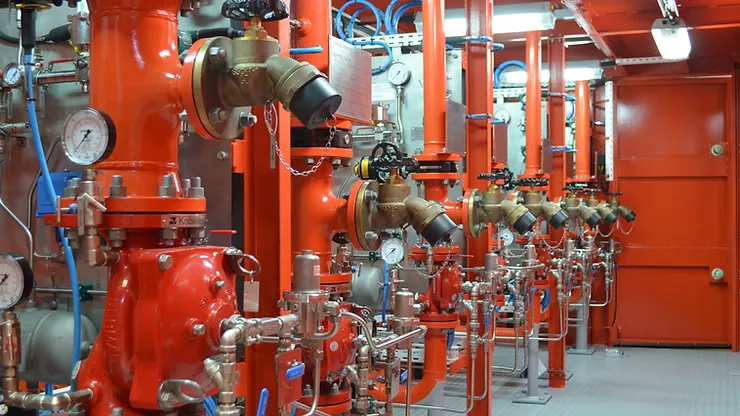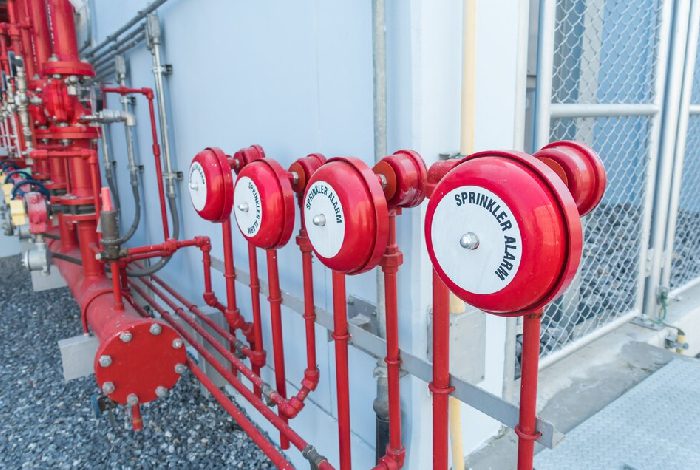Deluge Fire Protection Systems: What You Need to Know

How to Properly Use a Fire Extinguisher: A Step-by-Step Guide
July 30, 2023
Kitchen Hood Suppression Systems: Keeping Your Kitchen Safe
August 2, 2023A deluge fire protection system is a type of sprinkler system that uses open sprinkler heads and a dedicated water supply to quickly extinguish fires. The system is activated by a heat or smoke detection system, which opens a deluge valve and releases water to all of the sprinkler heads simultaneously. This flooding method is very effective at suppressing fires in high-hazard areas, such as power plants, aircraft hangars, and chemical plants.
Understanding Deluge Fire Protection Systems
Deluge fire protection systems are specialized fire suppression systems that are designed to provide rapid and effective fire control in high-risk environments. Unlike traditional sprinkler systems that activate individually, deluge systems work by flooding an entire area with water or foam in response to a fire detection signal. This ensures that the fire is quickly suppressed and prevented from spreading further.
The main components of a deluge fire protection system include a water supply, control valves, a detection system, and a network of pipes and nozzles. The detection system, which can be heat or flame-based, triggers the release of water or foam through the control valves and into the piping network. Once the system is activated, all the nozzles in the protected area discharge simultaneously, creating a deluge of water or foam that effectively covers the entire space.
Deluge fire protection systems are commonly used in high-hazard environments where rapid fire suppression is critical. These include industrial facilities with flammable materials, such as oil refineries and chemical plants, as well as infrastructure facilities like tunnels and airports. The ability of deluge systems to quickly flood an area with water or foam allows for the suppression of fires involving highly combustible substances or in locations where traditional sprinkler systems may not be sufficient.
How Does a Deluge Fire Protection System Work?
The two main components of a deluge fire protection system are the sprinkler heads and the deluge valve. The sprinkler heads are open and connected to a water supply. The deluge valve is closed and located at the inlet of the water supply.
When the heat or smoke detection system is activated, it opens the deluge valve. This allows water to flow from the water supply to the sprinkler heads. The water then flows out of the sprinkler heads and onto the fire, extinguishing it.
The water supply for a deluge fire protection system is typically a dedicated water line that is connected to a fire hydrant or other water source. The water supply must be able to provide enough water to flow through all of the sprinkler heads simultaneously.
The deluge valve is a critical component of the system. It is typically made of brass or steel and is designed to withstand high pressure. The deluge valve is usually located in a safe area, such as a fire pump room or control room.

Advantages of Deluge Fire Protection Systems
Deluge fire protection systems offer several significant advantages over other fire suppression methods. Their unique design and operation make them particularly effective in high-risk environments where rapid fire control is crucial. Here are some key advantages of deluge systems:
1. Rapid Fire Suppression: Deluge systems are designed to provide a swift response to fires, ensuring that the flames are quickly suppressed and prevented from spreading further. By flooding the entire area with water or foam, deluge systems create a powerful barrier against the fire, minimizing the risk to life and property.
2. High Volume Fire Suppression: The main advantage of deluge systems is their ability to deliver a high volume of water or foam in a short period of time. This is especially important in situations where the fire involves flammable liquids or gases, as a large amount of fire suppression agent is needed to control the flames effectively.
3. Coverage of Large Areas: Deluge systems are capable of covering large areas with water or foam, making them suitable for protecting expansive facilities or infrastructure. The simultaneous discharge of all the nozzles ensures that every part of the protected area is reached, providing comprehensive fire protection.
4. Flexibility and Customization: Deluge systems can be tailored to meet the specific needs of different environments. The choice of fire suppression agent, the design of the piping network, and the location of the nozzles can all be customized to ensure optimal performance. This flexibility allows deluge systems to be adapted to various types of high-risk environments.
5. Reliability and Redundancy: Deluge systems are known for their reliability and redundancy, ensuring that they can effectively operate even in challenging conditions. The use of multiple detection devices and control valves provides backup options in case of failure, minimizing the risk of system malfunction.
6. Integration with Fire Alarm Systems: Deluge systems can be integrated with fire alarm systems to provide a comprehensive fire safety solution. The activation of a fire alarm can trigger the deluge system, ensuring a rapid response to the fire. This integration enhances the overall effectiveness of the fire protection strategy.
Deluge fire protection systems offer rapid and efficient fire suppression, making them a vital component of modern fire safety strategies. Their ability to flood an entire area with water or foam in a short period of time ensures that fires are quickly controlled and prevented from causing extensive damage. Whether it’s a high-hazard industrial facility or a critical infrastructure site, deluge systems provide the necessary protection to safeguard lives and property.
When to Use a Deluge Fire Protection System
Deluge fire protection systems are typically used in high-hazard areas, where fires can spread rapidly. These areas include:
Manufacturing Facilities: Manufacturing facilities often handle flammable materials that can pose a significant fire hazard. Deluge systems are commonly used in industries such as petrochemical, pharmaceutical, and automotive manufacturing, where the risk of fire is high. The ability of deluge systems to quickly flood an area with water or foam ensures that any fire is swiftly extinguished, minimizing the potential for damage and disruption.
Oil Refineries and Chemical Plants: Oil refineries and chemical plants deal with highly flammable substances, making them prone to severe fires. Deluge systems are an essential component of fire protection in these facilities, providing rapid and effective fire suppression. The ability of deluge systems to deliver a high volume of water or foam ensures that the fire is quickly controlled, preventing its escalation and potential catastrophic consequences.
Tunnels and Underground Structures: Tunnels and underground structures present unique fire safety challenges due to limited escape routes and the potential for rapid fire spread. Deluge systems are commonly used in these environments to provide rapid and effective fire suppression. The ability of deluge systems to flood the entire space with water or foam ensures that any fire is quickly controlled, minimizing the risk to people and property.
Aircraft Hangars and Airports: Aircraft hangars and airports house valuable aircraft and have stringent fire safety requirements. Deluge systems are often used in these facilities to provide rapid fire suppression in the event of a fire. The ability of deluge systems to deliver a high volume of water or foam ensures that any fire is quickly extinguished, minimizing the potential for damage to aircraft and infrastructure.
These are just a few examples of the diverse applications of deluge fire protection systems. The versatility and effectiveness of deluge systems make them a valuable asset in any high-risk environment where rapid fire suppression is crucial.
Deluge fire protection systems are a valuable tool for fire protection in high-hazard areas. They are quick to operate, reliable, and easy to maintain. However, they can also cause water damage and are expensive to install. If you are considering a deluge fire protection system, be sure to weigh the pros and cons carefully.
You’ve come to the right place. Contact Cease Fire Solutions for a first-class deluge system that can douse any type of fire before it has a chance to grow uncontrollably. You can contact our team today and place an order and we can deliver it to your premises as quickly as possible. Our services are available to domestic, commercial and industrial customers across Qatar. We offer installation, repairs and maintenance as well.
To find out more about deluge fire protection systems, contact Cease Fire Solutions today at sales@ceasefireme.com.

